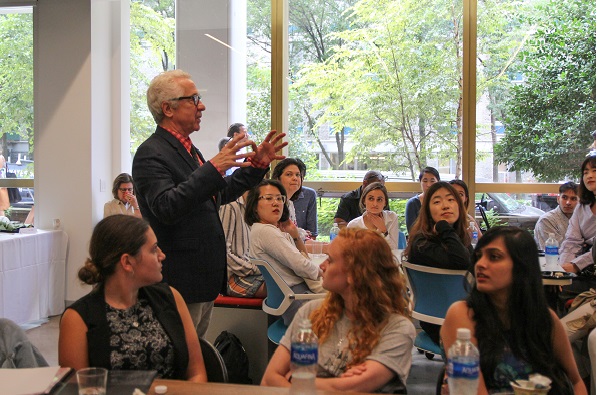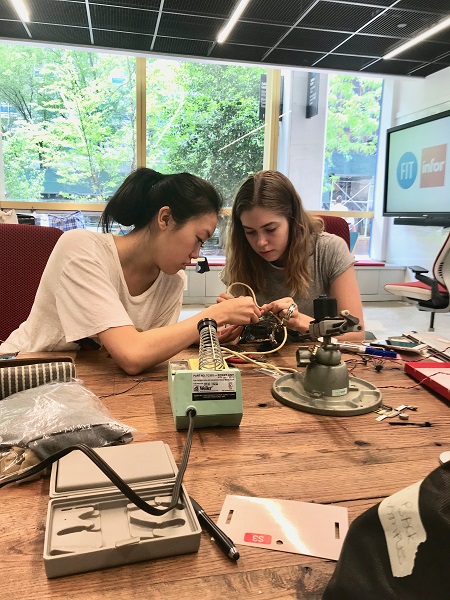
Since its inception in 2017, the FIT/Infor DTech Lab has collaborated with 16 faculty members and hired 60 student interns to design innovative technologies for major corporations like PVH and IBM. Students from across the college apply for these coveted, well-paying internships, which take place inside DTech, on the first floor of the Feldman Center, with frequent visits to the sponsoring companies. These companies have not only shown interest in adopting the students’ recommendations, they have offered some students further internships and jobs.
“These are experimental research environments,” says Michael Ferraro, executive director of DTech. “They’re not like any other internships, where you’re told what to do. Experiments have to be done again and again—it’s the process of ideation and iteration, so crucial to innovation. Not everyone is flexible enough to scrap everything and start over.”
In addition to the IBM/Tommy Hilfiger artificial intelligence project, DTech has facilitated the following internship experiences:
- Infor, DTech’s primary sponsor, is a company that develops software to manage the infrastructure and administration of large businesses. Students collaborated with Infor to reimagine dull employee training modules, tailoring them to three different types of employees: millennials at the bottom of the corporate ladder, middle managers, and executives. For millennials, they recommended a mobile-friendly app that incorporated elements of gaming; for executives, they suggested a personalized system powered by AI.
- A team of five students and an adjunct faculty member in Production Management worked with Infor to adapt its software to independent shoe designer Noah Waxman, an alumnus of the FIT Design Entrepreneurs program. The stripped-down, customized software they developed is streamlining Waxman’s operations and helping him plan for growth, and it provides a framework for Infor to develop products for other emerging designers. Infor extended three of the internships and expressed interest in hiring the students when they graduate. A follow-up project will recruit Communication Design Pathways students to enhance the software’s user experience, making it more functional and adaptable to mobile platforms.

- Two student interns tested out 3D-modeling programs that speed up the design process, then worked with one of them, Browzwear, at PVH. Check back soon for more on this project.
- Students worked with Swedish wearable tech company Neue to enhance products by POC Sports, which makes gear for cyclists, and Ann-Sofie Back, a subversive fashion line. For POC Sports, they embedded a microprocessor, sensors, and electroluminescent fabric in cycling pants, helmets, and bags, to improve biker safety. DTech is in discussions with a Swedish university to develop a blueprint for the advanced manufacturing necessary to create wearable tech.
- This academic year, business and design students are collaborating on an FIT private-label brand that will develop innovative practices in design, manufacturing, and retail, to serve as a case study for industry to follow. DTech interns are also analyzing in-store engagement at JCPenney, to help revive the company’s women’s apparel business.
“We felt like innovators,” says Lucy Chen, a Fashion Design student who worked on multiple projects in the lab. “Everyone had an ambitious aura about them. It was contagious.”
Not only is FIT becoming a recognized center for industry innovation, Ferraro says, “We’re putting students in a terrific position for internships and jobs.”
